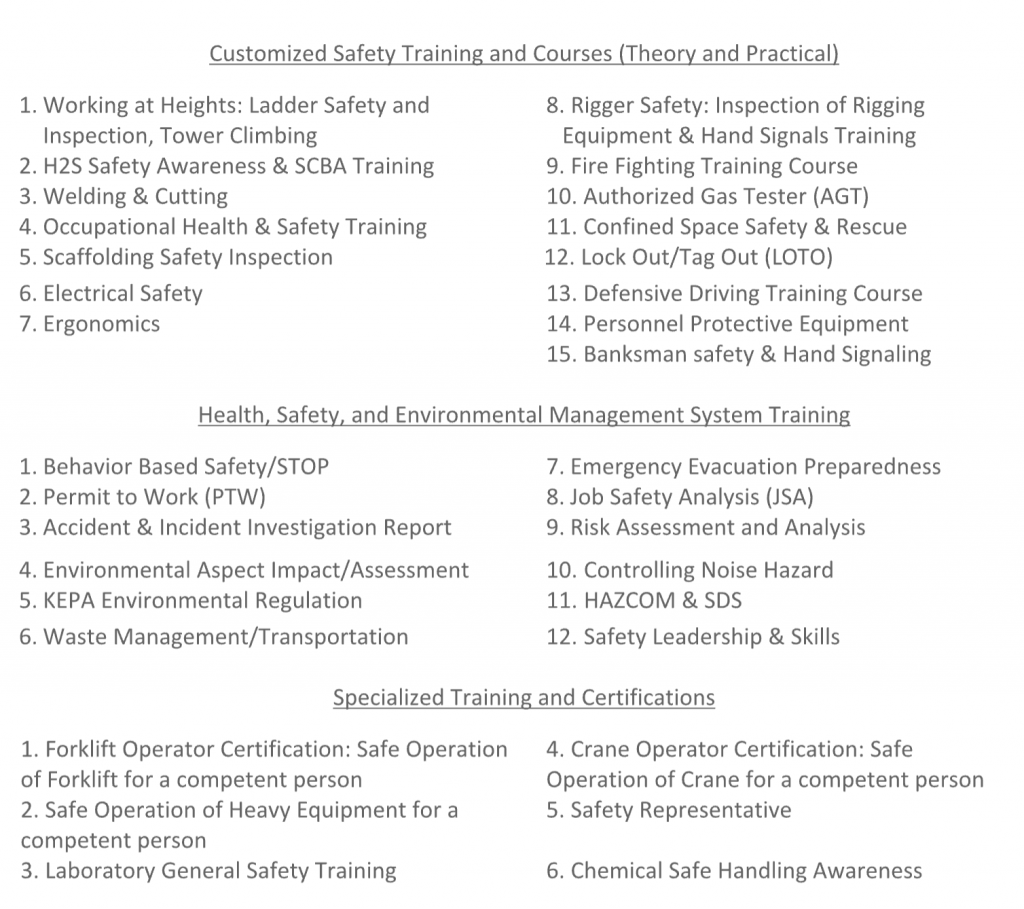HSE Courses
HSE Professional Training Courses
IES brings a wide range of global and local experts to the GCC to provide world class professional and technical training related to Health, Safety and the Environment.
Call Us | Register
Environmental Statistics and Data Analysis
Statistic for Non-Statistician, Teaching the concept not the formula
Environmental management generates tremendous volumes of data that is used to make essential policy and health decisions. This course is designed to help the student properly collect, analyze and present environmental data by extracting relevant information using appropriate statistical tests.
Areas covered by the course include:
Who should attend?
HSE professionals, managers, IT developers, and anyone who uses data to support business and environmental decisions.
Call Us | Register
Understanding Nature Conservation in Gulf Region
The course comprises the clear and concise definition of all terms surrounding nature conservation, such as biodiversity, ecosystem and sustainability, as well as their history and meaning for successful environmental protection. It describes biodiversity and ecosystems in Kuwait, grouping these by kind and explaining their importance for the country and the region. It presents and explains conservation, law and management guidelines with regards to biodiversity and ecosystems. It instructs the importance and methodology of using discussion and conversation, elements necessary for conservation, due to the complexity of the subject, on order to lead authorities and stakeholders to work together towards achieving optimal conservation results through sustainable decisions. It teaches the skill of identifying sources (in science, government policies, society, economics and other sources) to consult on every nature conservation issue in order to protect successfully and achieve sustainable use of natural habitats and ecosystems. It aims at giving participants all the tools needed to manage the wealth of nature (biodiversity and ecosystems) in their country for many years to come, thus securing it for future generations.
Areas covered by the course:
Who should attend?
- Environmental Police and compliance enforcement professionals
- Wildlife guards and rangers, environmental agency employees,
- Agriculture, logistics and customs professionals employees,
- Consultants dealing with biodiversity
Call Us | Register
Environmental compliance: Internal auditor training based on ISO14001
The course is a comprehensive coverage of all applicable requirements for environmental compliance. The training will study deeply every requirement listed in the ISO standards, explain how it applies, and cover any gaps, misapplications and challenges. The training will put the requirements to life and ensure that the trainee understands how the requirement applies to their facility or operation.
Who should attend ?
Any one in charge of environmental compliance, facilities or operations
Ares covered in the course:
We will be covering the emissions and their management including monitoring, record keeping, and reporting. The implications of non-compliance and how to ensure continuous compliance and prevent environmental violations
We will also cover the steps to perform a successful internal audit and share the results with corporate. In addition to preparing an action plan once the audit results are final.
Call Us | Register
Occupational Toxicology
A general background on the methodology in the field of occupational toxicology will be provided with an important role of occupational hygiene, epidemiology and medicine. Much attention will be given to methods of exposure assessment such as characterization of inhalation and dermal exposures and the use of biomarkers to study uptake of industrial chemical.
What will be covered?
Introduction to the principles of toxicology, physiology and epidemiology. The main types of harmful effects to target organs from exposure to chemical hazards at work, and the hazards associated with common hazardous substances. Definitions of commonly used toxicological terms; Describe the main routes by which hazardous substances can enter the body, and the factors which influence their absorption, distribution, storage and elimination Describe the main sources of information on hazardous substances and processes;Who should attend?
Individuals transitioning into the occupational safety field. Individuals who wish to increase their knowledge in specific areas in preparation for the Occupational Health and Safety Technologist examination. Other professionals in the industry who are involved in the development or management of a occupational health/industrial hygiene program and want to ensure their company meets government regulations and industry standards in the area of health and safety Professionals who participate in internal auditing and inspections in their facility Professionals who participate in preparation and implementation of HSE risk assessment in their facilities.Call Us | Register
Marine Conservation Management
Teaching definitions on marine conservation, examples thereof in different parts of the world. Importance thereof for the ecology of marine ecosystems, the culture of nations adjacent to the sea and for the economy of countries counting on the sea. How sustainable management of the seas and oceans contributes to ecotourism, prosperous seaside communities, healthy fisheries and balanced societies. Creation of marine protected areas in the world (different methodologies applied) and which international treaties support them. How marine protected areas, if managed properly, attract attention of environmental groups and investors. In Kuwait, and in the Gulf, how marine conservation if enhanced could benefit the environment and the economy.
Call Us | Register
Fundamental of Occupational Health
Gain exposure to the broad field of industrial hygiene through sampling and workshop sessions, hands-on lab experiences, demo sessions, and problem-solving exercises. This Five days course is not only designed for OEHS professionals new to industrial hygiene or who have newly acquired IH responsibilities, but also serves as an excellent refresher.
Call Us | Register
HSE Awareness Programs
HSE Awareness Programs

